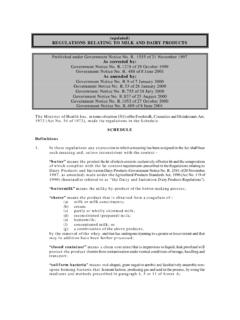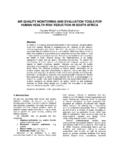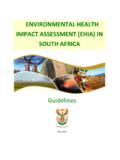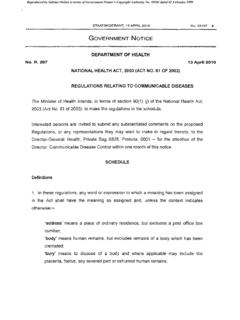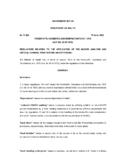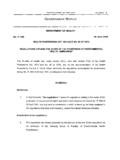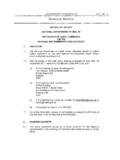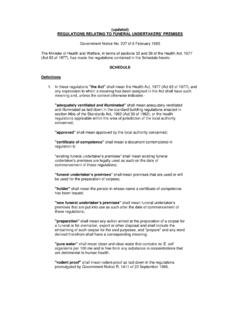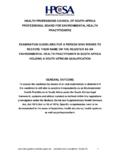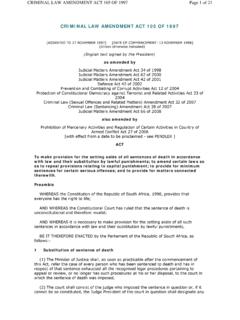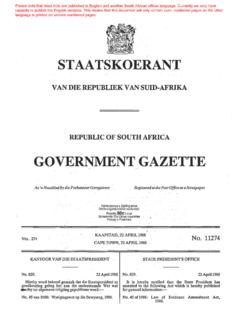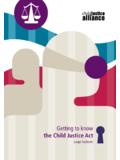Transcription of Criminal Procedures Act 51 of 1977 - EHRN
1 Criminal PROCEDURE ACT NO. 51 OF 1977 [ASSENTED TO 21 APRIL, 1977 ] [DATE OF COMMENCEMENT: 22 JULY, 1977 ] (Afrikaans text signed by the State President) As amended by Criminal Procedure Matters Amendment Act, No. 79 of 1978 Criminal Procedure Amendment Act, No. 56 of 1979 Criminal Procedure Amendment Act, No. 64 of 1982 Appeals Amendment Act, No. 105 of 1982 [With effect from 1 April 1983] Criminal Law Amendment Act, No. 59 of 1983 Criminal Procedure Matters Amendment Act, No. 109 of 1984 Immorality and Prohibition of Mixed Marriages Amendment Act, No. 72 of 1985 Criminal Procedure Amendment Act, No. 33 of 1986 Special Courts for Blacks Abolition Act, No. 34 of 1986 [With effect from 1 August 1986] Transfer of Powers and Duties of the State President Act, No. 97 of 1986 [With effect from 3 October 1986] Criminal Procedure Amendment Act, No. 26 of 1987 Law of Evidence and the Criminal Procedure Amendment Act, No.
2 103 of 1987 Law of Evidence Act, No. 45 of 1988 [With effect from 3 October, 1988] Criminal Procedure Amendment Act, No. 8 of 1989 Criminal Law and the Criminal Procedure Amendment Act, No. 39 of 1989 Judicial Matters Amendment Act, No. 77 of 1989 [with effect from 31 July, 1989] Criminal Law Amendment Act, No. 107 of 1990 Criminal Procedure Amendment Act, No. 5 of 1991 Transfer of Powers and Duties of the State President Act, No. 51 of 1991 [with effect from 29 April, 1991] Correctional Services and Supervision Matters Amendment Act, No. 122 of 1991 [with effect from 15 August, 1991] Criminal Law Amendment Act, No. 135 of 1991 Criminal Law Amendment Act, No. 4 of 1992 Prevention and Treatment of Drug Dependency Act, No. 20 of 1992 [with effect from 30 April, 1993] Attorney-General Act, Act No. 92 of 1992[With effect from 31 December, 1992] Criminal Law Second Amendment Act, No.
3 126 of 1992 General Law Amendment Act, No. 139 of 1992 [with effect from 7 August, 1992] Criminal Matters Amendment Act, No. 116 of 1993 General Law Third Amendment Act, No. 129 of 1993 [with effect from 1 September, 1993] General Law Fifth Amendment Act, No. 157 of 1993 [with effect from 1 December, 1993] General Law Sixth Amendment Act, No. 204 of 1993 [with effect from 1 March, 1994] Criminal Procedure Second Amendment Act, No. 75 of 1995 Justice Laws Rationalisation Act, No. 18 of 1996 [with effect from 1 April, 1997] General Law Amendment Act, No. 49 of 1996 [with effect from 4 October, 1996] International Co-operation in Criminal Matters Act, No. 75 of 1996 [with effect from 1 January, 1998] Criminal Procedure Second Amendment Act, No. 85 of 1996 Criminal Procedure Amendment Act, No. 86 of 1996 Abolition of Restrictions on the Jurisdiction of Courts Act, No.
4 88 of 1996 [with effect from 22 November, 1996] Abolition of Corporal Punishment Act, No. 33 of 1997 Criminal Procedure Amendment Act, No. 76 of 1997 Criminal Procedure Second Amendment Act, No. 85 of 1997 Criminal Law Amendment Act, No. 105 of 1997 National Prosecuting Authority Act, No. 32 of 1998 [with effect from 16 October, 1998] Judicial Matters Amendment Act, No. 34 of 1998 [with effect from 1 August, 1998 and 15 January, 1999] Criminal Matters Amendment Act, No. 68 of 1998 Maintenance Act, No. 99 of 1998 [with effect from 26 November, 1999] Witness Protection Act, No. 112 of 1998 [with effect from 31 March, 2000] Domestic Violence Act, No. 116 of 1998 Judicial Matters Second Amendment Act, No. 122 of 1998 [with effect from 18 July, 2003, unless otherwise indicated] Judicial Matters Amendment Act, No. 62 of 2000 [with effect from 23 March, 2000] Criminal Procedure Amendment Act, No.
5 17 of 2001 Judicial Matters Amendment Act, No. 42 of 2001 [with effect from 7 December, 2001, unless otherwise indicated] Criminal Procedure Second Amendment Act, No. 62 of 2001 Implementation of the Rome Statute of the International Criminal Court Act, No. 27 of 2002 Criminal Procedure Amendment Act, No. 42 of 2003 ACT To make provision for Procedures and related matters in Criminal proceedings 19. Saving as to certain powers conferred by other laws. The provisions of this Chapter shall not derogate from any power conferred by any other law to enter any premises or to search any person, container or premises or to seize any matter, to declare any matter forfeited or to dispose of any matter. 20. State may seize certain articles. The State may, in accordance with the provisions of this Chapter, seize anything (in this Chapter referred to as an article) (a) Which is concerned in or is on reasonable grounds believed to be concerned in the commission or suspected commission of an offence whether within the Republic or elsewhere; (b) Which may afford evidence of the commission or suspected commission of an offence whether within the Republic or elsewhere; or (c) Which is intended to be used or is on reasonable grounds believed to be intended to be used in the commission of an offence.
6 40. Arrest by peace officer without warrant. (1) A peace officer may without warrant arrest any person- (a) Who commits or attempts to commit any offence in his presence; (b) Whom he reasonably suspects of having committed an offence referred to in Schedule 1, other than the offence of escaping from lawful custody; (c) Who has escaped or who attempts to escape from lawful custody; (d) Who has in his possession any implement of housebreaking or carbreaking as contemplated in section 82 of the General Law Third Amendment Act, 1993, and who is unable to account for such possession to the satisfaction of the peace officer; (e) Who is found in possession of anything which the peace officer reasonably suspects to be stolen property or property dishonestly obtained, and whom the peace officer reasonably suspects of having committed an offence with respect to such thing.
7 (f) Who is found at any place by night in circumstances which afford reasonable grounds for believing that such person has committed or is about to commit an offence; (g) Who is reasonably suspected of being or having been in unlawful possession of stock or produce as defined in any law relating to the theft of stock or produce; (h) Who is reasonably suspected of committing or of having committed an offence under any law governing the making, supply, possession or conveyance of intoxicating liquor or of dependence-producing drugs or the possession or disposal of arms or ammunition; (i) Who is found in any gambling house or at any gambling table in contravention of any law relating to the prevention or suppression of gambling or games of chance; (j) Who wilfully obstructs him in the execution of his duty; (k) Who has been concerned in or against whom a reasonable complaint has been made or credible information has been received or a reasonable suspicion exists that he has been concerned in any act committed outside the Republic which, if committed in the Republic, would have been punishable as an offence, and for which he is, under any law relating to extradition or fugitive offenders, liable to be arrested or detained in custody in the Republic; (l) Who is reasonably suspected of being a prohibited immigrant in the Republic in contravention of any law regulating entry into or residence in the Republic; (m) Who is reasonably suspected of being a deserter from the South African National Defence Force.
8 (n) Who is reasonably suspected of having failed to observe any condition imposed in postponing the passing of sentence or in suspending the operation of any sentence under this Act; (o) Who is reasonably suspected of having failed to pay any fine or part thereof on the date fixed by order of court under this Act; (p) Who fails to surrender himself in order that he may undergo periodical imprisonment when and where he is required to do so under an order of court or any law relating to prisons; (q) Who is reasonably suspected of having committed an act of domestic violence as contemplated in section (1) of the Domestic Violence Act, 1998, which constitutes an offence in respect of which violence is an element. (2) If a person may be arrested under any law without warrant and subject to conditions or the existence of circumstances set out in that law, any peace officer may without warrant arrest such person subject to such conditions or circumstances.
9 41. Name and address of certain persons and power of arrest by peace officer without warrant. - (1) A peace officer may call upon any person- (a) Whom he has power to arrest; (b) Who is reasonably suspected of having committed or of having attempted to commit an offence; (c) Who, in the opinion of the peace officer, may be able to give evidence in regard to the commission or suspected commission of any offence, to furnish such peace officer with his full name and address, and if such person fails to furnish his full name and address, the peace officer may forthwith and without warrant arrest him, or, if such person furnishes to the peace officer a name or address which the peace officer reasonably suspects to be false, the peace officer may arrest him without warrant and detain him for a period not exceeding twelve hours until such name or address has been verified.
10 (2) Any person who, when called upon under the provisions of subsection (1) to furnish his name and address, fails to do so or furnishes a false or incorrect name and address, shall be guilty of an offence and liable on conviction to a fine not exceeding R300 or to imprisonment for a period not exceeding three months. 54. Summons as method of securing attendance of accused in magistrate s court. (1) Where the prosecution intends prosecuting an accused in respect of any offence and the accused is not in custody in respect of that offence and no warrant has been or is to be issued for the arrest of the accused for that offence, the prosecutor may secure the attendance of the accused for a summary trial in a lower court having jurisdiction by drawing up the relevant charge and handing such charge, together with information relating to the name and, where known and where applicable, the residential address and occupation or status of the accused, to the clerk of the court who shall- (a) Issue a summons containing the charge and the information handed to him by the prosecutor, and specifying the place, date and time for the appearance of the accused in court on such charge.
